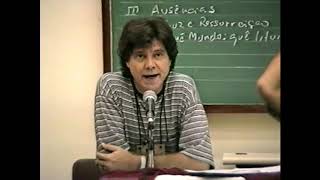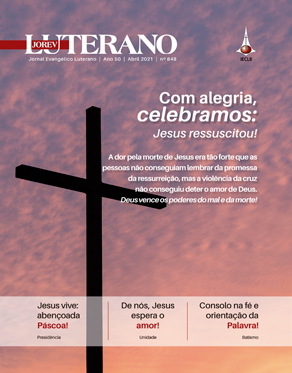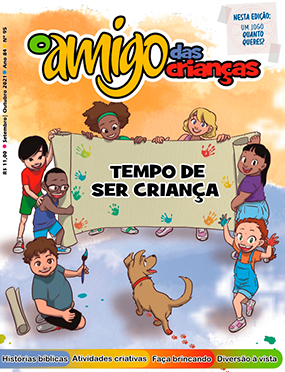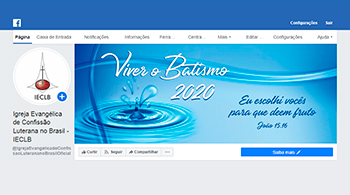
A Rather Unique Conference
Vítor Westhelle is a professor of theology at the Lutheran School of Theology at Chicago, USA, and the author of books, articles and chapters of books published in different parts of the world. At the Seminar on Liturgy, Art and the City he coordinated the systematization team. On that occasion he gave the following interview to Antonio Carlos Ribeiro:
ACR - What are the main systematization lines of the Seminar on Liturgy, Art and the City that you are drafting?
VW - This Seminar was quite fortunate in the organization of the theme. It managed to be at the same time quite comprehensive in the discussion of the problem of liturgy in the urban context and also in its interface with art. It managed to be specific, but rather comprehensive in the issues that are now relevant in the contemporary discussion on liturgy.
ACR - What are the Seminar's contributions to the congregations, the churches and the persons who make liturgy?
VW - It has two basic contributions. One of them is the exercise, the way in which the Seminar served as a workshop for the actual production and not only for theorizing about liturgical possibilities. It enabled the participants to produce text, art, music, poetry. All these areas already offered an opportunity, along with the exercise of theologizing. Thus there was a unity of theory and praxis that was rather surprising. The second aspect would be less surprising, since it is part of any conference: the theoretical discussion. Every morning we had rich conferences on various dimensions of the three areas that entered into dialogue here: the city, art and liturgy. The integration of these two aspects seemed to me to constitute the most relevant feature of this Seminar, the feature that rendered it rather unique in its ability to establish an organic interaction between theory and practice.
ACR - In the Urban Mass, produced by pastor Anders Lindow, there are petitions that reflect an urban environment: that the streets may be illuminated, that the traffic be safe, that people be secure in the trains. We are a church with a rural tradition on historical grounds, and urban tradition is just beginning to emerge in it. Can the Seminar offer a contribution to churches such as the Evangelical Church of the Lutheran Confession in Brazil?
VW - It's certainly one of the seminars I know of that managed to offer a contribution, a challenge, a projection of the church into urban reality. It's interesting that this is occurring in the area of liturgy, which at present is undergoing a rather radical redefinition, which is also related to the transition in Brazilian society. In 1960 66% of the Brazilian population lived in rural areas, and today it's estimated that only 23-24% are in these areas. This is a period of 30-40 years, in which a total demographic change of Brazilian society in terms of the relation between rural and urban areas took place. And this brutal change is not yet reflected in several churches, particularly in the Lutheran church, which still has around 50% of its membership living in rural areas. Through this discussion about liturgy the church is faced with the need to remake its language, because when we are talk about liturgy, we are referring to the way in which the church publicly offers the parameters of language that define it, that offer the church's own identity. It's in the liturgy, rather than in its constitution, its policies or even its theology, that the public face of the church, of its own self-understanding is projected. Thus the search for a liturgy in the city is precisely the search for a new self-definition of the church, in order to rediscover itself as a church that is now astonished in view of this tremendous urban reality in the Brazilian cities, with all their problems and challenges.
ACR - The issue of language has to do not only with theology and congregational practices on weekdays and on Sundays, but also with the production of meaning. An it seems that the relation between rural and urban areas presents a deficit in relation to the city. There's a deficit in the way in which the churches produce meaning in an urban environment. What can we expect from this Seminar in terms of facing this situation?
VW - One has to look with suspicion at some unveiled or unconscious assumptions within a project. And one of them is the liturgical language as a producer of meaning in the relationship between God and the world. Because the liturgy attempts to formulate how the church understands itself, it attempts to ritualize. To formulate is to ritualize. I'm referring to the assumption that this would simply be an unblocked road towards finding a new image. The issue is a little more complicated, since the liturgy offers precisely this - and that's why it's necessary and important -, but at the same time it's also a compromise formation. Every language is always a compromise formation, it's a way of finding oneself in the world, but also of protecting oneself from the world. Insofar as the liturgy is a specific language, it's a way of finding oneself in the world and in relation to God, but also a way of protecting oneself in relation to this world and to God. And that is what is complicated about making that transition, because those who were able to make that transition in Brazilian society have done it with a liturgy that is at best minimalistic. These are the churches that have really exploded in urban areas, that avoid or pass by the classic and traditional constraints of the liturgy and offer an experience of immediacy. The charismatic movement and the pentecostal churches have been very successful as they almost reduce to a minimum that need for an established language, as they reinvent themselves or have to be reinvented in a very dynamic way, making it possible for the holy to really have its epiphany in an almost immediate way in the context in which people live. And in this way it also disappears. For the liturgy is not only an attempt to establish a relationship between God and the world, between the human being and God, but also a way of establishing and controlling, of creating even power mechanisms that allow someone to navigate with a certain confidence in this territory that is so unusual. And that is what characterizes the traditional churches: they are an access, but they're also a veil in that relationship. There's no easiness, there's no level of comfort in an intimacy with the holy as it is offered by other religious expressions that are typically urban.
ACR - That means that the traditional churches remain in the dilemma of not giving up the classic forms and at same time of updating that in terms of the urban images. Will this continue to be a dilemma?
VW - It will continue to be a dilemma as long as the cities continue. And there's no prediction that this is going to change in a near future, as long as the cities continue to be what they are and continue to be defined the way they are. This violent collectivity and this brutal individuality and isolation of people, this fragmentation, but at the same time this possibility of an almost immediate communication with all things, all these characteristics of the period in which we live are magnified within the experience of the city itself. This has to do with the transposition to the city of a liturgy that was born, grew and developed in environments that, even being urban, were different from what the city is today, where the mediating function in the relationship between God and human beings was a function that could be vastly controlled, administered. The social institutions, later the political institutions of civil society and mainly the institution of the church functioned as a stable support for that mediation of the relationship between God and human beings, which theology tries to guide, which the liturgy tries to verbalize or to put into language. What is happening is an attempt to reintroduce those stable mediations in a city that has practically exiled the possibility of stable mediations. This is a rather unusual process, and I don't think that this is the time to judge whether there is a possibility that this will take place or not, also because it depends on a number of other variables that will determine the project's success or failure. But it's clear what this project is all about, and this Seminar was certainly a highlight in the expression of the goal of this project, that this project is really what we need and are looking for. One could ask: what is the purpose of liturgy in the city? There's religion in the city, but not every religion is necessarily liturgical. All epiphanic experiences are, by definition, non-liturgical. They don't get established, are not ordered, they don't have an ordo in the sense in which the liturgists use this word. They simply occur, they have a charismatic character in the original meaning of the word. They happen in a moment of grace, of spontaneous manifestation. And the liturgy is by definition an attempt to administer that relationship, to prevent it from being so unpredictable and spontaneous.
ACR - How can the churches face this new moment, between that post-modern uninterestedness Jaci Maraschin referred to in his lecture and the corpus, which is not given up in terms of Christian and liturgical tradition?
VW - Regina Novaes raised an issued that got lost in the discussions. She reminded us that all great religions, including Christianity, are fruits of syncretic processes. And we define syncretism as a mixture of different religious traditions within one context. But there's also a diachronic way of defining it: we are always reappropriating in a hybrid way things that belong to contexts of the past, which are not necessarily fruits of the ethos of the society in which we live, but which, for one reason or another, be they atavistic or ancient, have their own charm and are incorporated into all our cultural reality. We know how valuable some antiques are and the reverence we have to things that belong to the past, that are not necessarily part of our existence, but are incorporated in it. Something similar occurs in the liturgy, a process of hybridization of past elements that are reintroduced, reformulated, redimensioned into the present situation. That's the task. It's not a matter of being faithful either to the past or to the context, but of trying to look from within, at the dynamic process of reappropriation of typically traditional or even pre-modern values, which continue to resettle in, to relocate themselves within contexts that are completely different from those in which they emerged. In this way they acquire a new life, become readapted in an almost parasitical way within another reality.














